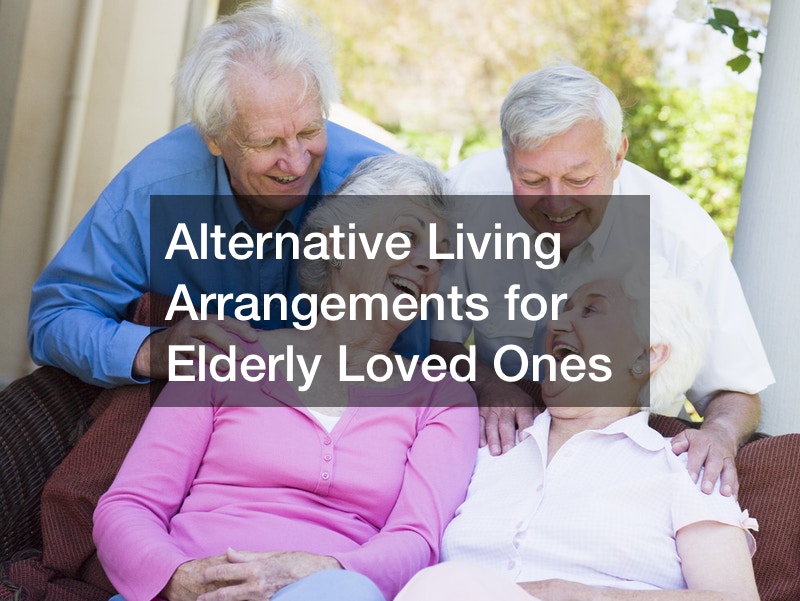Alternative Living Arrangements for Elderly

Are you looking for alternative living arrangements for elderly loved ones, or maybe you want to check out some options for when you are older? There are several housing options for seniors and their families to consider. The type of housing option you go with depends on the senior’s health status, mobility, and whether or not they need home care. Here are some alternative living arrangements for elderly people that you might be interested in.
Home Care Services

This option for alternative living arrangements for elderly individuals is ideal for seniors with minimal medical needs. If your loved one just needs assistance with activities of daily living, then home care services may be the best option. For instance, if someone uses hearing aids by they can move around fairly well. However, you may need several types of support services with this option. If you need help assessing the needs of your loved one, you can engage the services of a senior care manager. They will assess your situation and tell you what type of support is needed. They are can even recommend an alternative housing arrangement for your loved one. You can also get the same assessment from a Client Care Coordinator.
Some of the in-home service options you might need include home-delivered meals and transportation. Some seniors may also need companionship and homemaking care. Most people go for the staying at home option because it can be less expensive than other options. However, before this can be a possibility, the home needs to be modified to cater to the senior’s changing needs.
Staying at home while one age is also known as aging in place. Some of the modifications that might need to be made include moving a bedroom to the main floor. You can also install a shower grab bar in the bathrooms and a custom glass shower door that’s easy to open so the home can be safer to navigate. You must consider modifiying the floors to concrete for more grip. In terms of aethetics, you can look into concrete floor polishing. This type of arrangement is feasible for most seniors.
When you look for personal care workers for aging in place, you should find someone who provides services like cooking, cleaning, and running errands. If your loved one requires skilled care, you can find agencies that provide therapists and nurses to assist with medication. However, you should remember that Medicare won’t pay for ongoing custodial care. This is usually covered by long-term care insurance.
Moving in With the Kids
This option of alternative living arrangements for elderly people can work for some, but it might not be ideal in other situations. You can decide to have a loved one move in with you, or you can move in with them. One of the most significant advantages of this option is that it can be a win-win financially. You won’t have to spend a lot of money on care services. Apart from that, you can also get some fringe benefits. For instance, the older parent can help with babysitting. They, in turn, benefit from enjoying the company of their loved ones. A busy household can do a lot of good for someone in their old age. They will no longer be lonely, reducing the risks associated with the stress of not having anyone around.
The key to success when it comes to having an elderly loved one move in with you is to set clear guidelines. You need to make sure that everyone involved has the same expectations. For instance, you must discuss things like personal space, water management plan and bill sharing.
Independent Living, or Retirement Communities
Independent living consitist of several alternative living arrangements for elderly people where seniors generally live independently in a residential setup. Independent living facilities can take up various forms. However, most of them generally consist of private accommodations with some common or shared facilities.
For instance, you can check your loved one into an apartment built primarily for those older than 55 years. Such communities feature private apartments and kitchens together with shared facilities like pools. You may also find pools, theaters, tennis courts, and a library. Such communities usually host outings and social events.
The cost of independent living varies with the type of facility. Unfortunately, because the facilities can also differ greatly, there are no real averages. However, most of these communities cost anywhere between $1,500 and $6,000 per month. The factors that contribute to the price differences include the amenities and location.
Co-housing

There are several types of alternative living arrangements for elderly people under independent living. These include Cohousing. An elderly cohousing facility usually consists of several private homes constructed around a shared space. The shared space can just be greenery, or it can even be a clubhouse. Within a cohousing arrangement, each individual is financially independent. However, they all share the responsibility of maintaining the neighborhood, and all of them are involved in decision-making.
Green Housing
This is a new type of nursing home or memory care unit. Within each greenhouse, you will find only a few residents. The residents share a home-like atmosphere, and there aren’t as many restrictions in the greenhouse. This enables the residents to get the care they need without stressing the healthcare providers too much. The greenhouse type of setup aims to create a happy and healthy atmosphere. The attendants also make sure that each resident feels respected.
Micro-Communities
Micro-communites are a type of alternative living arrangements for elderly that are more like assisted living facilities. As you might have guessed from their name, these facilities are essentially small communities suitable for those who are unwilling to be part of a larger, more crowded assisted living facility. They can also work in situations where the resident requires special attention due to either the personality of their medical status.
Multi-gen Housing
Multi-generational housing facilities are an an option for alternative living arrangements for elderly individuals that’s almost self-explanatory. These are a type of living arrangement where you find a minimum of three generations of family members all under the same roof and on the same property.
Niche Senior Retirement Communities

This type of alternative living for the elderly consists of a niche community composed of the elderly. The members of these communities stay in separate or attached homes. Sometimes the living spaces can even be within an apartment building. However, unlike other living facilities, niche senior retirement communities are composed of people that have shared interests or traits. For instance, one facility may be occupied by people interested in birdwatching or carpentry, music, or cooking. In some instances, people can also be classified according to their sexual orientation or common religion.
The level of assistance provided to seniors in each community varied according to individual needs. Things like mobility and health status are also considered.
Subsidized Housing
There are several types of federal housing programs that can help to stabilize the accommodation expenses of seniors. These programs are available at the state and city levels. Unfortunately, such programs are usually quite complex to navigate. For this reason, most people find them quite daunting. If you are looking to take advantage of such programs in the future, it is advisable to meet with a housing counselor in advance. These meetings are facilitated by the Department of Housing and Urban Development. Because the application process can take a lot of time, it would be better to start applying before needing accommodation. Apart from that, such programs have waiting lists as well.
Life Plan Communities
Life plan communities don’t exactly fall into the category of affordable housing for seniors. They are an option for those people who have access to a significant amount of cash. This is because an entry fee is required before becoming part of these communities. These communities are suitable for those that need skilled nursing care in the future. To cater to individuals with different health needs, life plan communities combine a variety of living arrangements on one campus. This allows seniors to move from facilities where they are more independent to those that provide assisted living. Some communities can even be all-inclusive. You can even find some of these more expensive facilities offer access to a cosmetic surgeon.
Lifeplace communities usually offer contract options. However, most of them provide everything at a fixed rate. If the resident comes to a point where they can no longer afford the rate, some communities have assistance programs that can take over the costs. However, if the facility is pro-profit, such options are usually unavailable. This is why it’s crucial to read the fine print before committing to such facilities.
Assisted Living

If your loved one does not require the skilled medical services of nursing homes but has challenges living independently, it may be a good idea to consider this option for alternative living arrangements for elderly individuals. Assisted living facilities provide the support that elderly residents need to manage their daily activities. These communities often provide regular meals in a common dining facility. You can also find a snack distributor in some areas and the facility may offer ag lime delivery. In addition, they also offer help with things like laundry, housekeeping, bathing, and dressing, among others. Each facility also has 24-hour security and staff.
While an assisted living facility doesn’t provide the health services offered by a nursing home, they also provide access to health and medical services. Most of them also provide medical supervision and assistance. Depending on the type of billing arrangement, the fee that you pay can also cater to transportation.
Nursing Homes
A nursing home is a perfect option for alternative living arrangements for elderly people who require full-time care. Unlike independent or assisted living facilities, one can only access these homes through a physician’s order. Nursing homes provide 24-hour nursing and medical services. They also provide personal care services. For instance, the residents will be assisted with dressing, eating, bathing, speed therapy, social activities, and meals. The meals can be served in a common dining room or a senior’s room.
Continuing Care Retirement Communities
These communities combine independent living and assistant living facilities. They also feature skilled nursing services. This means that residents of such facilities can gain access to varying service levels depending on their current needs. It can also be possible for a resident to move from an independent living section to an assisted living section and then move back when they are better able to take care of themselves. The services offered in such facilities vary, but they generally include things like housekeeping, laundry, home, and garden maintenance. In all of the facilities, you will also find 24-hour security. Other communities also offer exercise, golf, tennis, and swimming facilities.
Unlike other facilities, the residents in continuing care retirement communities need to sign a legal agreement to gain access to housing and services for life. You might need to engage the family lawyer for this. If you don’t have one, you can just search the internet. If an attorney that specializes in this type of law has invested in attorney SEO, it will be easy to find them.
There are two types of nursing homes. These include intermediate care facilities (ICF) and skilled nursing facilities (SNF). Intermediate care facilities offer at least eight hours of nursing services daily. On the other hand, skilled nursing facilities offer 24-hour nursing supervision. Unlike other facilities, you will find that nursing homes require a license to operate. They must also meet Medicare certification standards for them to receive funding.
Hospice Care
This is a type of care facility that is suitable for individuals that would have been diagnosed with a terminal illness. Hospice care can either be provided at home, or it can be offered in a nursing home. Hospice services include nursing care, therapy, and emotional support. They also come with spiritual and bereavement support.
If you decide to check your loved one into any type of community, it’s important to support them. You must understand that any move can be quite stressful for an elderly loved one. One of the most challenging things they have to deal with is the stress of the unknown. This is why it’s important to ensure that your loved ones understand exactly what’s offered where they are going and what type of living arrangement they will have.
You also need to acknowledge your loved one’s feelings of loss. Even if they are willing to move, they will still go through a time when they will be feeling lost. You must never minimize their feelings. Instead, you should sympathize with them and respect what they will be going through.



